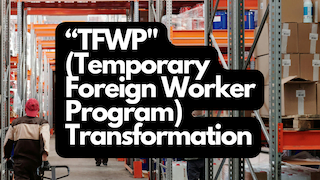Canada is making modifications to its Temporary Foreign Worker Programme (TFWP) in response to changing labour market conditions and the ongoing pandemic recovery process.
Canada implemented interim measures to address employment market concerns during the pandemic. But as the labour market becomes more competitive and the time between job openings and job closures gets shorter, there is less and less need for these measures.
The Canadian job market fluctuated during the pandemic; the fourth quarter of 2023 saw a fall for the sixth time in a row, starting from the second quarter of 2022. In spite of these variations, the rate of employment has generally increased. Nonetheless, industries continue to struggle to find qualified candidates to fill open positions.
When hiring foreign nationals through the TFWP, Canadian businesses can file for a Labour Market Impact Assessment (LMIA) if they are unable to identify suitable candidates among permanent residents for open positions. Work permits are granted under this programme to foreign nationals who can assist in bridging skills shortages in the Canadian labour market.
Governments at all levels are putting a lot of effort into helping firms find qualified workers through initiatives that focus on workforce skills enhancement, onboarding, and hiring in order to fulfil labour market demands.
One of the previous interim remedies to alleviate pandemic-related market conditions was to extend the validity of the LMIA to a year. However, the LMIA validity will return to six months on May 1, 2024. Employers participating in the Recognised Employer Pilot programme will not be impacted by this change.
It continues be difficult for small business owners, especially those in the transportation, wholesaling, and construction industries, to find qualified candidates for open positions.
The construction industry continues to struggle with hiring, despite the substantial demand for labour, particularly in the residential construction sector.
From May 1, 2024, the TFWP will only allow up to 30% of workers in the healthcare and construction industries to be paid low pay. The government enhanced this temporary provision, which was first offered in 2022, for specific sectors.
The TFWP low-wage group in the Canadian workforce should not rise above 20%; the exception for seasonal employers and the agricultural sector should not change.
The need for qualified personnel is also fueled by employee retirements, aging workforce and persons quitting their positions. Government initiatives to upskill the labour force are crucial to addressing the demands of the job market.
Due to the notable rise in international enrollment, recent statements on caps on study permits and modifications to the Post-Graduation Work Permit (PGWP) programme have been made. The integrity of Canada’s immigration system, which is essential to the nation’s economy, is what these modifications are intended to reinforce.
Businesses are expanding, which is generating employment, but there is a lack of workers with certain skills. Demand is high for candidates with experience in programming, agriculture, and a variety of other industries, including food services, construction, transportation, and healthcare.
The number of temporary residents in Canada has increased significantly, and as of 2023, there were 2.5 million, or 6.2% of the total population. In order to guarantee a well-managed, sustainable immigration system that satisfies the needs of Canadians and the economy, efforts are being made to lower this percentage to 5% over the course of the next three years.
The TFWP has been modified to reflect Canada’s commitment to a responsive and balanced immigration policy that promotes economic development while defending the rights of both international and local workers.
